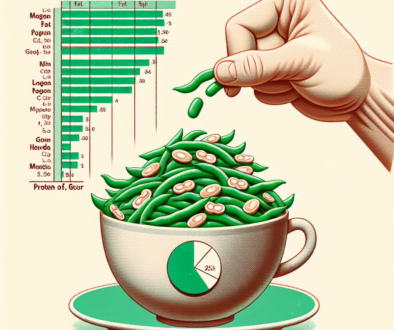Mung Beans and GI: Dietary Considerations
-
Table of Contents
- Mung Beans and GI: Understanding Dietary Impacts and Health Benefits
- Introduction to Mung Beans
- Understanding Glycemic Index (GI)
- Nutritional Profile of Mung Beans
- Health Benefits of Mung Beans
- Mung Beans in the Diet: How to Incorporate Them
- Case Studies and Research on Mung Beans and GI
- Comparing Mung Beans to Other Legumes
- Preparing Mung Beans: Tips and Tricks
- Conclusion: Embracing Mung Beans for a Healthier Diet
- Discover ETprotein’s High-Quality Mung Bean Protein Products
Mung Beans and GI: Understanding Dietary Impacts and Health Benefits

Mung beans, a staple in many Asian cuisines, have been gaining popularity worldwide due to their nutritional benefits and versatility in various dishes. As people become more health-conscious, understanding the dietary impacts of foods, particularly their glycemic index (GI), is crucial. This article delves into the relationship between mung beans and GI, exploring how incorporating these legumes into your diet can offer significant health advantages.
Introduction to Mung Beans
Mung beans, scientifically known as Vigna radiata, are small, green legumes that belong to the Fabaceae family. They are a rich source of protein, fiber, vitamins, and minerals, making them an excellent addition to a balanced diet. Mung beans are also known for their low GI, which is a measure of how quickly foods raise blood sugar levels after consumption.
Understanding Glycemic Index (GI)
The glycemic index is a ranking system for carbohydrates based on their immediate impact on blood glucose levels. Carbohydrates that break down quickly during digestion have a high GI; they cause a rapid rise in blood glucose. Conversely, carbohydrates that break down slowly, releasing glucose gradually into the bloodstream, have a low GI.
- High GI foods (GI of 70 or more): white bread, most white rices, corn flakes, glucose.
- Medium GI foods (GI of 56-69): whole wheat products, basmati rice, sweet potato, sucrose.
- Low GI foods (GI of 55 or less): most fruits and vegetables, legumes, nuts, fructose.
Choosing low GI foods can help manage long-term health conditions, including diabetes and high cholesterol, and can contribute to weight management and overall health.
Nutritional Profile of Mung Beans
Mung beans are not only low in GI but also packed with essential nutrients. Here’s a breakdown of their nutritional content:
- Protein: Mung beans are a great source of plant-based protein, which is vital for muscle repair and growth.
- Fiber: High in dietary fiber, mung beans help promote digestive health and can aid in weight management.
- Vitamins: They contain B vitamins, particularly folate, which is important for DNA synthesis and preventing neural tube defects during pregnancy.
- Minerals: Mung beans are rich in minerals such as potassium, magnesium, and iron, which are essential for various bodily functions.
- Antioxidants: These legumes contain antioxidants that help combat oxidative stress and may reduce the risk of chronic diseases.
Health Benefits of Mung Beans
The low GI and rich nutrient profile of mung beans contribute to several health benefits:
- Improved Blood Sugar Control: The low GI of mung beans helps in maintaining stable blood sugar levels, which is beneficial for diabetics.
- Heart Health: The fiber and antioxidants in mung beans can lower bad cholesterol levels, reducing the risk of heart disease.
- Weight Management: High fiber content promotes a feeling of fullness, which can help prevent overeating and support weight loss efforts.
- Digestive Health: Fiber aids in regular bowel movements and the prevention of digestive disorders.
- Pregnancy: The folate in mung beans is crucial for pregnant women to help prevent birth defects.
Mung Beans in the Diet: How to Incorporate Them
There are various ways to include mung beans in your diet:
- As a main dish: Mung beans can be cooked and used as the primary protein source in meals.
- In soups and stews: They add texture and nutrients to soups and stews.
- As a salad ingredient: Sprouted mung beans are a crunchy addition to salads.
- In baking: Mung bean flour can be used in gluten-free baking.
- As snacks: Roasted mung beans make a healthy, crunchy snack.
With their versatility, mung beans can easily become a regular part of a balanced diet.
Case Studies and Research on Mung Beans and GI
Several studies have highlighted the benefits of mung beans in relation to GI and overall health:
- A study published in the Journal of Nutrition and Metabolism found that mung beans had a GI value of 25, categorizing them as a low-GI food.
- Research in the Asia Pacific Journal of Clinical Nutrition showed that participants who included mung beans in their diet had improved blood sugar control.
- A study in the British Journal of Nutrition indicated that the fiber in mung beans could reduce hunger and increase the feeling of fullness.
These studies underscore the potential of mung beans as a dietary component for managing health and preventing disease.
Comparing Mung Beans to Other Legumes
When compared to other legumes, mung beans stand out due to their low GI and nutrient density. For example, chickpeas and lentils also have low GI values but may have slightly higher carbohydrate content. Black beans and kidney beans have similar protein levels but are higher in GI than mung beans.
Preparing Mung Beans: Tips and Tricks
To get the most out of mung beans, proper preparation is key:
- Soaking: Soak mung beans in water for several hours to reduce cooking time and improve digestibility.
- Cooking: Boil soaked mung beans until tender, which typically takes about 20-30 minutes.
- Seasoning: Mung beans have a mild flavor, so they pair well with a variety of spices and herbs.
- Storage: Cooked mung beans can be stored in the refrigerator for up to five days or frozen for longer shelf life.
With these tips, you can easily add mung beans to your meals for a nutritious boost.
Conclusion: Embracing Mung Beans for a Healthier Diet
Mung beans are a powerhouse of nutrition with a low GI, making them an excellent choice for those looking to improve their dietary habits. Their versatility in cooking and potential health benefits, such as blood sugar control and heart health, make them a valuable addition to any diet. By incorporating mung beans into your meals, you can enjoy their rich nutrient profile while managing your GI intake.
Discover ETprotein’s High-Quality Mung Bean Protein Products
If you’re looking to incorporate more plant-based proteins into your diet, ETprotein offers a range of high-quality mung bean protein products. Their mung bean protein is organic, non-GMO, and allergen-free, making it an excellent choice for those with dietary restrictions or preferences. Whether you’re a food manufacturer or a health-conscious consumer, ETprotein’s products can help you meet your protein needs with confidence.
About ETprotein:
ETprotein, a reputable protein Chinese factory manufacturer and supplier, is renowned for producing, stocking, exporting, and delivering the highest quality organic bulk vegan protein and plant proteins. They include Organic rice protein, clear rice protein, pea protein, clear pea protein, pumpkin seed protein, sunflower seed protein, mung bean protein, etc. Their offerings, characterized by a neutral taste, non-GMO, allergen-free attributes, cater to a diverse range of industries. They serve nutraceutical, pharmaceutical, cosmeceutical, veterinary, as well as food and beverage finished product distributors, traders, and manufacturers across Europe, USA, Canada, Australia, Thailand, Japan, Korea, Brazil, and Chile, among others.
ETprotein specialization includes exporting and delivering tailor-made protein powder and finished nutritional supplements. Their extensive product range covers sectors like Food and Beverage, Sports Nutrition, Weight Management, Dietary Supplements, Health and Wellness Products, and Infant Formula, ensuring comprehensive solutions to meet all your protein needs.
As a trusted company by leading global food and beverage brands and Fortune 500 companies, ETprotein reinforces China’s reputation in the global arena. For more information or to sample their products, please contact them and email sales(at)ETprotein.com today.












